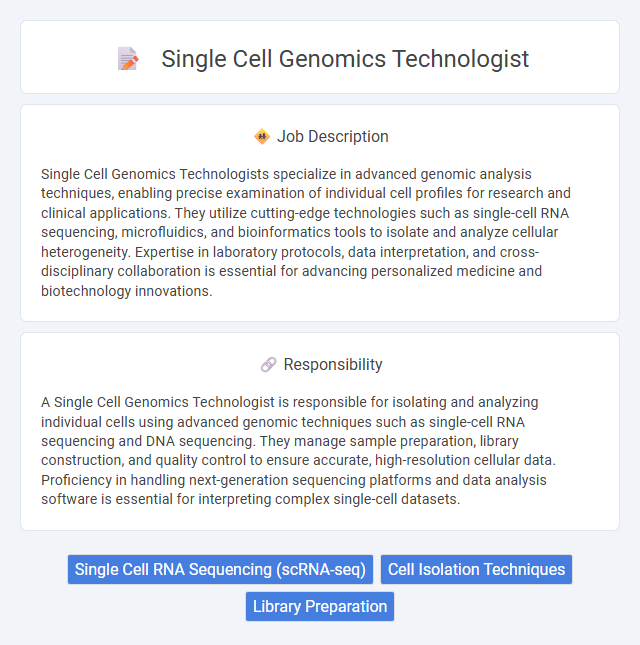
Single Cell Genomics Technologists specialize in advanced genomic analysis techniques, enabling precise examination of individual cell profiles for research and clinical applications. They utilize cutting-edge technologies such as single-cell RNA sequencing, microfluidics, and bioinformatics tools to isolate and analyze cellular heterogeneity. Expertise in laboratory protocols, data interpretation, and cross-disciplinary collaboration is essential for advancing personalized medicine and biotechnology innovations.
Individuals with strong analytical skills and a keen interest in molecular biology are likely suitable for a Single Cell Genomics Technologist role, as the job demands precision and expertise in handling complex genomic data. Candidates comfortable with laboratory environments and working extensively with single-cell sequencing technologies may find this position aligns well with their abilities and interests. Those who thrive in meticulous, detail-oriented tasks and enjoy problem-solving within cutting-edge genomic research are probably well-suited for this career.
Qualification
A Single Cell Genomics Technologist must possess a strong background in molecular biology, genetics, or biotechnology, typically supported by a bachelor's or master's degree in related fields. Proficiency in next-generation sequencing (NGS) technologies, single-cell isolation techniques such as FACS or microfluidics, and bioinformatics tools for data analysis are essential qualifications. Experience with laboratory automation and stringent adherence to quality control protocols enhances the technologist's ability to generate accurate, high-resolution genomic data at the single-cell level.
Responsibility
A Single Cell Genomics Technologist is responsible for isolating and analyzing individual cells using advanced genomic techniques such as single-cell RNA sequencing and DNA sequencing. They manage sample preparation, library construction, and quality control to ensure accurate, high-resolution cellular data. Proficiency in handling next-generation sequencing platforms and data analysis software is essential for interpreting complex single-cell datasets.
Benefit
Working as a Single Cell Genomics Technologist likely offers the benefit of engaging with cutting-edge genomic technologies that enhance research precision and personalized medicine. Professionals in this role probably experience career growth opportunities due to the increasing demand for expertise in single-cell analysis techniques. Access to collaborative environments and advanced laboratory resources may also contribute positively to job satisfaction and skill development.
Challenge
Single Cell Genomics Technologist roles likely involve complex challenges related to handling and interpreting vast amounts of data generated from individual cells. The high precision required for sample preparation and sequencing might present technical difficulties that demand advanced problem-solving skills. Navigating rapidly evolving technologies in single-cell genomics could also contribute to ongoing professional challenges.
Career Advancement
Single Cell Genomics Technologists develop expertise in isolating and analyzing individual cells to drive breakthroughs in biomedical research, enhancing their value in precision medicine and drug discovery. Mastery in advanced techniques like droplet-based sequencing and bioinformatics analysis propels career growth toward senior research roles or specialized positions in genomics companies and academic institutions. Continuous skill development in data interpretation and laboratory automation opens opportunities for leadership roles in biotechnology innovation and personalized healthcare solutions.
Key Terms
Single Cell RNA Sequencing (scRNA-seq)
Expertise in Single Cell RNA Sequencing (scRNA-seq) enables precise analysis of gene expression at an individual cell level, critical for understanding cellular heterogeneity in complex tissues. Proficiency in sample preparation, library construction, and data interpretation using bioinformatics pipelines ensures accurate identification of cellular subpopulations and novel biomarkers. Advanced knowledge of scRNA-seq platforms such as 10x Genomics Chromium and integration with spatial transcriptomics enhances insights into dynamic cellular processes and disease mechanisms.
Cell Isolation Techniques
Single Cell Genomics Technologists specialize in advanced cell isolation techniques such as fluorescence-activated cell sorting (FACS), microfluidics, and laser capture microdissection to obtain pure populations of individual cells for genomic analysis. Expertise in optimizing isolation protocols ensures minimal cell damage and maximal yield, critical for accurate sequencing and downstream bioinformatics interpretation. Mastery of these techniques directly impacts the quality of single-cell RNA sequencing (scRNA-seq), DNA sequencing, and epigenomic profiling data, driving innovations in personalized medicine and cellular heterogeneity research.
Library Preparation
Single Cell Genomics Technologists specializing in library preparation perform critical tasks such as isolating individual cells, amplifying nucleic acids, and converting these into high-quality sequencing libraries. Expertise in techniques like microfluidics, barcoding, and quality control ensures accuracy and reproducibility in single-cell RNA-seq or DNA-seq experiments. Mastery of advanced molecular biology protocols and bioinformatics tools is essential for optimizing library construction and downstream genomic data analysis.
 kuljobs.com
kuljobs.com